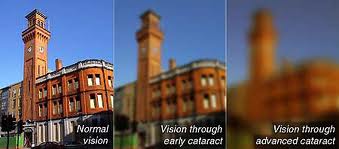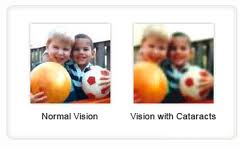Some vision conditions like nearsightedness, farsightedness and astigmatism affect us from birth because they are related to irregularities of the cornea. Others, like cataracts and presbyopia, creep up on us as we age. Both can be effectively treated with cataract surgery and intraocular (within the eye) lens implants, also called IOL’s.
Cataracts are the result of the eye’s lens becoming tinted and cloudy. This accounts for over 48% of the world’s correctible blindness. Sooner or later cataracts affect just about everyone.
Studies show that cataracts affect:
- 42% of those between the ages of 52 to 64
- 60% of those between the ages of 65 and 74
- 91% of those between the ages of 75 and 85
With these statistics, it is easy to see why cataracts are commonly associated with age. However, you don’t have to be a senior citizen to have cataracts. They can start developing at age 40, though usually at this stage, they’re not serious enough to have a significant effect on your vision.
The term “cataract” comes from a Latin word meaning “waterfall” and describes the whitening or cloudy effect of rushing water. The eye’s lens is made mostly of water and protein. In a healthy lens the protein is normally clear and permits light to pass through. As we age, the protein can clump and begin to cloud a small section of the lens, forming a cataract.
Over time, the cataract may grow larger and cloud more of the lens, making it harder and harder to see.
Types of Cataracts
- Nuclear: the most common type of cataract that affects the center of the eye
- Cortical: begins in the periphery (outer edges), and grows toward the center
- Subcapsular: affects the back of the lens and develops rapidly

Symptoms of Cataracts
So how do you know if you have a cataract?
The following are symptoms of cataracts:
- Blurred or cloudy vision
- Colors appear faded or dull
- Lamps such as headlights or streetlights have glare or halos; sunlight may appear too bright
- Poor night vision
- Double or multiple vision in one eye; this effect may disappear as the cataract grows
- Frequent prescription changes in your eyeglasses or contact lenses
Important Note: These symptoms can indicate other eye problems that may also result in blindness if left untreated. If you have any of these symptoms, make an appointment with Atlantis Eyecare immediately for a complex eye examination.





